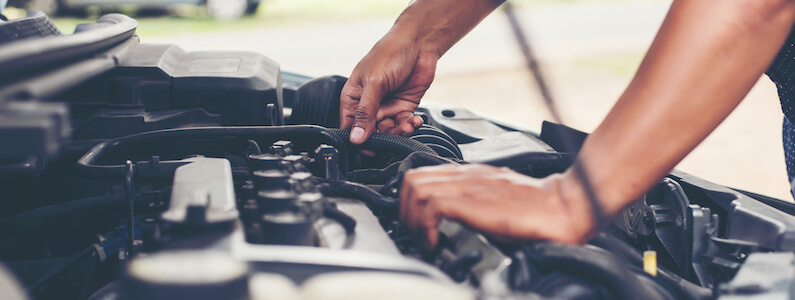Aside from the signature noise of V8 and V12 engines, also in some cases of engines that have big fans fitted to it, loud engine noise may be considered abnormal in some cases. When an unfamiliar noise starts coming from smaller engines like a 4 cylinder inline or a V6 engine, it may get you worried. We will discuss some of the source areas mechanics find to be the most common places for engine noises to originate from.
Valve Train Noise
Valve and hydraulic lifter noise has a clicking sound that usually quiets down as you raise the engine RPM’s. A lifter is what opens and closes intake and exhaust valves. These noises can be caused by worn or sticking hydraulic lifters. Sticking lifters in most cases is caused by a varnish build up on the lifter surfaces. They may also be caused by low oil pressure (which would cause a hydraulic lifter to collapse).
Valve Train Noise
Valve and hydraulic lifter noise has a clicking sound that usually quiets down as you raise the engine RPM’s. A lifter is what opens and closes intake and exhaust valves. These noises can be caused by worn or sticking hydraulic lifters. Sticking lifters in most cases is caused by a varnish build up on the lifter surfaces. They may also be caused by low oil pressure which would cause a hydraulic lifter to collapse.
Sticking lifter problems can many times be solved by adding a detergent additive to the oil. If this doesn’t do away with the noise, then the worn lifters that continue to make noise would require replacement. This is not an easy or cheap job and will need to be done by a trained auto repair technician.
Timing Chain Noise
Many of the newer engines have overhead camshafts with longer timing chains. A timing chain connects the crankshaft to the camshaft to insure the valves open at the proper time. The slack in these chains is usually kept tight by hydraulic tensioners. The chains ride against a nylon guide (a chain guide) which, in time, begins to wear. At the point where the chain guides are worn beyond the ability of the hydraulic tensioner to take up the slack, the timing chain begins to rattle. This noise is caused by the timing chains becoming so loose that they whip back and forth against the guides and possibly the timing cover.
If the oil pressure is correct, replacement of the hydraulic tensioners and chain guides would be required. A mechanic’s stethoscope is a great tool to pinpoint this noise. If the noise is loudest when touching the timing cover with the stethoscope disassembly would be required to confirm and to repair the problem. This is a semi major job for most of these engines and would usually cost a bit.
Detonation, Pre-ignition (Pinging) Noise
You usually hear this noise when accelerating the vehicle. Most people call this a pinging or rattling sound. This noise is caused by an air/fuel mixture in the engine cylinder being ignited prematurely by the heat of compression as the piston is moving up on the compression stroke. If ignition happens before the piston reaches the top of its stroke, this is called pre-ignition or pre-detonation, which can damage the pistons, valves and connecting rods. They get damaged because the fuel igniting too early produces pressure waves from the fuel’s explosion in the cylinder, which collide with the cylinder as it’s moving up. And that’s also why you hear the pinging and rattling noises.
Some of the causes of this condition are improper fuel octane, engine overheating, improper ignition timing, the EGR valve not functioning properly and problems with the computer or knock sensor. All these conditions can cause the air fuel mixture in the cylinders to ignite before it’s supposed to. This creates multiple flame fronts in the cylinder fighting each other and causing the pinging and rattling noise. Check your owner’s manual to make sure you’re using the right grade of fuel. Or you can switch to a higher grade for a period and see if the noise goes away. If it doesn’t, you’ll want to look at these other possible causes.
Connecting Rod Noise
Connecting rod noise is caused by excessive clearance between the crankshaft and the connecting rod bearing surface. This happens when you have low oil pressure causing the bearing to run dry of lubrication, which in turn will damage the bearing and crankshaft surfaces. This can also be caused by poor maintenance practices such as not changing oil at a regular interval. The oil gets dirty and grit can wear the surface of the bearings. The noise you hear is a knock that is heard towards the bottom of the engine. The noise is usually heard when you hold the throttle at a steady RPM. If it sounds like a single knock, you (or your mechanic) can isolate the cylinder by disabling the spark or the fuel injector for each cylinder one at a time. When the noise goes away or gets much quieter, you have found the problem. Problems like this require immediate attention because continued running of the engine in this condition will damage the crankshaft and require a major engine overhaul. The rule of thumb is, once you hear the noise there is a high probability you will need major engine work.
Crankshaft Bearing Noise
Crankshaft bearing noise is also caused by low oil pressure which damages the bearing surfaces and could eventually damage the crankshaft itself. This type of noise is usually described as a rumbling or thumping sound deep in the engine when accelerating. If this sound is heard, it is extremely important that the engine not be run again until the oil pan is removed and the crankshaft bearings are inspected. In many cases the engine can be saved if the crankshaft is not damaged. A mechanic will fix the problem by replacing the bearings and solving the oil pressure problem. Bearing shells are what the crankshaft rotates within. If you continue to run the engine with this condition, you will most certainly cause a major engine failure. It is also a high possibility that when you hear the noise it may be too late to save it without removing the engine.
Piston Slap
This noise is caused by excessive clearance between the piston skirt and the cylinder wall, and is usually found on high mileage vehicles. The usual cause of this problem is cracks in the lower piston skirt. The piston skirt is the lower part of the piston which will develop cracks over time due to metal fatigue. The noise sounds like a muffled bell sound or a hollow clatter deep in the engine and is more noticeable when the engine is cold. If the noise goes away when the engine warms up, nothing needs to be done. The clearance is reduced by the expansion of the piston skirt as the engine comes up to temperature, and in many cases the noise goes away completely. If the noise is reduced when the engine temperature rises but does not go away, then replacing the piston itself would be the most likely remedy. There is really nothing you can do to prevent this problem and, luckily, it’s not as serious a repair job as some of the ones above.
Piston Pin Noise
Piston pin noise is similar to valve train noise. The noise is unique because you will hear a double knocking sound caused by the lack of oil and excessive clearance between the piston pin and the piston. A piston pin attaches the connecting rod to the piston. It is lubricated by oil which is sprayed onto the pin through a hole in the opposing cylinder’s connecting rod.
This condition can only be remedied by replacing the piston pin bushings, possibly even the piston itself, along with solving the oil pressure or lubrication problem. Problems like this are usually a result of worn connecting rod and crankshaft bearings which reduces oil pressure. If you have this problem, it will result in major engine work.
Whining Noise
A whining noise when an engine is running is usually an indication of a bearing that is on the verge of failure. This noise will increase as the engine RPMs increase. There are multiple places in the engine where bearings are used. Thus, there are several items under the hood that can make this kind of whining sound. The water pump, air conditioner clutch bearing (which will only be heard when the compressor is not engaged), fan belt idler pulleys or belt tensioner, alternator and the power steering pump – these are all possible sources for whining sounds indicating future bearing failure.
Whining from the power steering pump will get louder when turning the steering wheel from side to side and the usual cause is low power steering fluid. The best way to diagnose the other bearing noises is with a mechanic’s stethoscope. Failure to repair any one of the items making a whining sound can result in a vehicle break down. Not only that, but other engine components can be damaged when parts with bearings eventually come apart. So it’s a smart idea to get this kind of problem checked out. Spend a little money now to save a lot of money later.
If you hear other noise you are not sure about, contact us by following this link: I need to check my engine fill the appointment form and a specialist will contact you with 24 hours.
 Spot Dem Everything About Cars
Spot Dem Everything About Cars






